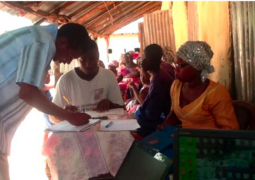According
to the Multiple Indicator Cluster Survey iii (MICS) report launched on the 30thof June 2008, The Gambia has a low consumption
rate of iodised salt. This corresponds with the most recent UNICEF Report,
which tracked progress since the 1990 World Summit for Children on the
Elimination of Iodine Deficiency. In that report, globally, The Gambia ranked
only second from bottom ahead of
There can be no excuses made to try and justify this situation. This is simply a case of us having a clearly identified problem with a very simple solution and instead of addressing it we have let it slip further beyond our control. Whoever is responsible should be identified and forced to answer for their actions. This is more than a simple issue of health, it is an issue of health which has long term impact on the future development of The Gambia. It must be addressed, quickly and effectively.
A media
release from UNICEF states that it's estimated that because the consumption of
un-iodised salt in The Gambia is so widespread, our children's IQ average has
been lowered by as much as 15 percentage points. This means that children's
intellectual capacities are affected, eroding their ability to retain
information in their learning processes. Additionally, the release added,
mothers are subsequently affected, because women who also do not consume
iodised salt are at risk of miscarriages, and sill births, which contributes to
the Maternal Mortality Rate, which is one of the highest in
That this situation would continue is unacceptable. It is an all too clear example of a shocking failure on the part of the government and answers, not excuses, must now be provided by those responsible.
Other nations have made progress in this area but despite a worldwide effort to drastically raise the level of consumption of Iodised salt from less than 20% in 1990 to 70% today, countries like The Gambia are in a precarious situation. In the case of The Gambia a decrease in consumption of iodised salt has actually been registered, from 8% in 1995 to 7% in 2005. This leaves us at one tenth of the global figure. Those with the power to change this situation must come up with solutions and very quickly. If they need any kind of inspiration they should refer to the passage in the release quoted above. It states, " This situation threatens all the gains made in immunisation, education, sensitisation and protection. Children in The Gambia are today, amongst the most threatened. The risk of physical deformity, blindness, infections such as severe anaemia and measles are greater when children do not have enough iodine in their bodies. This affects almost 10,000 babies born each year, who suffer from intellectual impairment caused by iodine deficiency in pregnancy."
It ends with some good advice. "UNICEF urges strong partnerships to ensure that the commitment made by the government of The Gambia, through the National Assembly and the Cabinet, in enacting the Food Act is built upon to ensure that all children and pregnant women in The Gambia consume iodised salt and a diet rich in iodine." We couldn't agree more!
Read Other Articles In Article (Archive)




